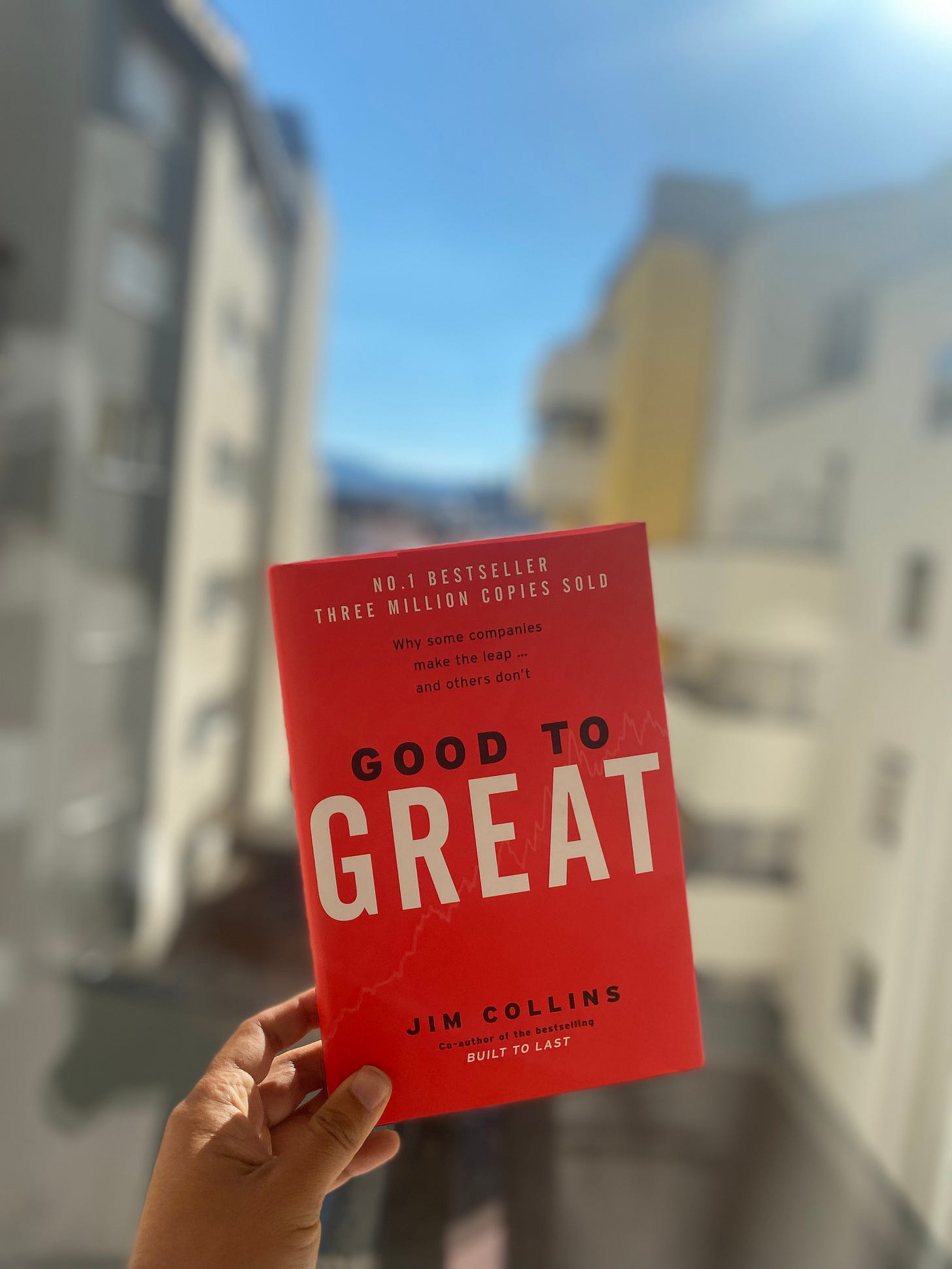📚Good to Great > Transforming good companies into great ones. A Sunday with Jim Collins
People are not the most important asset in a company. Right people are.
Episode #74. Hey Sunday reader 👋🏼
This Sunday, The Timestamp is here again to help you! This past week, I listened to a series of good podcasts about the French media landscape but I am not sure it will be of interest to you Sunday readers. I would like to surf on the good summer vibes of reading recommendations. Last week, I feel blessed that my friend Olivier picked “Le Mage du Kremlin” (Ed. Gallimard) because I put a word about this book in The Timestamp. Book recommendations it was last week; book recommendation this will be this Sunday as well.
I have been catching up on some great books about business for the past few years. But I think the intro part about “Good to Great” written by the famous Jim Collins deserves a dive. This business bible is nothing less than a summary of the results of a long-lasting study. The author and his crew found what differentiates great companies (outperforming their market and their competitors) from good ones (just being on par with their market performance).
I will just focus on the beginning of the book to avoid spoiling you 🙏
Start with people then think
Jim Collins spends the first part of his book exposing how the people factor is important in transforming companies from good to great. Yes, it is so ‘déjà vu’ right?
The striking finding here is not that the right people are the number one factor for outperformance; what matters the most is to start with people… before you even figure out which direction you want to drive your company.
And talking about people, Collins focuses first on the typical profile of the leader who will be most successful at transforming a company from good to great: ‘Level 5 leaders’.
“Compared to high profile leaders with big personalities who make headlines and become celebrities, the good-to-great leaders seem to come from Mars. Self-effacing, quiet, reserved, even shy, these leaders are a paradoxical blend of personal humility and professional will”.
When asked about the success of their company, ‘level 5 leaders’ oftentimes speak of their great team always using the “we” posture. They also make reference to luck “we have been so lucky with the great team we have been able to assemble in this company”.
People in a culture of discipline
The 2 questions that come to mind first then: “ok but then how do you make sure you have the right people in your company” and then “how would you describe the ‘right’ people”?
« All companies have a culture, some companies have discipline, but few companies have a culture of discipline. When you have disciplined people, you don’t need hierarchy ».
The author gives 3 hints to inject the right discipline:
“When in doubt, don't hire. Keep looking.” The growth rate of great companies depends on their ability to hire great people.
“When you know you need to make a people change, act.” This also means you have to make sure people are in the right position in your company.
“Put your. best people on your biggest opportunities, not your biggest problems”.
« The moment you feel the need to tightly manage someone, you've made a hiring mistake » .
Good to great principles
In case you just need some more clues before reading the book yourself, here are a few key takeaways :
Do not focus only on what to do to become great. Focus on what you should stop doing.
Technology is never the basis for transforming a company from good to great. Technology is an accelerator.
Mergers & acquisitions have no impact to foster a change from good to great; assemble 2 mediocre companies… and you will just obtain a bigger mediocre company.
Good-to-great companies pay zero attention to motivating their employees. Having the right people creates an automatic alignment and motivation framework. The change follows naturally.
More About Jim Collins 🎙
The most valuable asset in life from this podcast 👇
🤝 Think of what is more valuable in life, relationships or transactions? Ask a friend who benefits the most from your relationship > if both answer ‘me’, it is a great relationship you do not want to stop.
✍🏾 Writing is like running, if it is not hard, you are probably not making progress.
⏰ Flywheel effect and the Stockdale paradox > think of fueling with 20% change from 6 to 12 then measure what comes out from 12 to 6. Success comes from making slight changes (20%) more often than changing too much 👉 changing 20% to have an 80% effect.
🪙 Bad outcomes do not necessarily come from bad decisions. No decision is often worse than a bad decision.
Jim Collins is the author of some of the most popular business books in history, including Good to Great, Beyond Entrepreneurship (BE 2.0), Built to Last, How The Mighty Fall, and many more.
This newsletter is 100% free. You can make us super happy just by sharing it with a teammate, a friend, or a family relative. Just click on the button you see below.
Clicking on ❤️ will also make us know you really read it 😅. Can you do it?
See you next Sunday!





